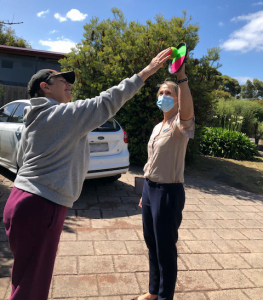How Behaviour Support Practitioners Assist NDIS Participants
What is Positive Behaviour Support?
Positive Behaviour Support (PBS) is a person-centred and evidence-based approach that focuses on understanding why behaviours happen in order to enhance the Participant’s quality of life and wellbeing, and the life of those who support them.
PBS is about making all aspects of the environment a better fit for the Participant. This involves taking into consideration the Participant’s preferences and life experiences, and understanding what could be better so that the need to engage in behaviours of concern are reduced. PBS supports the Participant to develop skills that help them to get their needs met in better ways.
Under the NDIS (Behaviour Support and Restrictive Practices) Rules 2018, specialist behaviour support services are to be provided by an NDIS Behaviour Support Practitioner who the NDIS Commissioner has considered suitable. This includes undertaking behaviour support assessments (including functional behavioural assessments) and developing behaviour support plans that may contain the use of restrictive practices.
At National 360, all of our PBS Practitioners have been assessed as suitable to deliver specialised behaviour support services.
How do Behaviour Support Practitioners Assist NDIS Participants?
Behaviour Support Practitioners play a critical role in improving the quality of life for NDIS Participants by helping them acquire valuable life skills, access the necessary supports and services they need to lead fulfilling lives within their communities, and ultimately reduce the need to engage in behaviours of concern. Their work is essential in promoting inclusion, independence, and well-being for individuals with disabilities.
Here are the services National 360 Behaviour Support Practitioners provide in order to assist NDIS participants:
1. Initial Assessment and Therapy Plan
An initial assessment appointment is the first step in supporting a NDIS Participant in the PBS journey.
The Positive Behaviour Support Practitioner (PBS Practitioner) will meet with the appropriate stakeholders to understand why Behaviour Support services are required, which includes reviewing current behaviours of concern, risks and restrictive practices.
The PBS Practitioner will also use this as an opportunity to get to know the NDIS Participant and aspects of their life including who they are as a person, their interests, medical history, how they spend their day, opportunities available to them and what support services are currently involved.
Behaviour Support goals will then be developed in line with the expected outcomes of the service in the form of a Therapy Plan, so that progress is easy to follow.
2. Functional Behaviour Assessment
If a Behaviour Support Plan is required, the Positive Behaviour Support Practitioner (PBS Practitioner) will conduct various assessments to better understand why behaviours happen. This process is known as a Functional Behaviour Assessment (FBA) and involves working collaboratively with the Participant and their supports.
This may consist of data collection, observations, assessments, and interviews, in order to develop an understanding of the Participant and how they interact with their environment, which either makes behaviour more or less likely to occur.
3. Behaviour Support Plan (BSP)
A Behaviour Support Plan, also known as a BSP or ‘the plan’, is a structured document typically based on the outcome of a FBA. It is developed in consultation with the Participant and their supports, that effectively addresses the needs of the Participant.
A BSP contains strategies that improves the Participant’s quality of life, promotes skill building, reduces behaviours of concern, and reduces and eliminates the use of restrictive practices (if any).
There are two types of BSPs: Interim and Comprehensive. See What is a Behaviour Support Plan for more information.
4. Training/ Implementation
Once a BSP has been developed, the Positive Behaviour Support Practitioner (PBS Practitioner) will implement the plan by providing education and training to the Participant’s stakeholders, so that everyone can support the Participant effectively and consistently.
The PBS Practitioner will also regularly monitor and review progress made to ensure that the plan is working. This involves ongoing data collection and assessment, in which adjustments to the plan may be required.
5. NDIS Progress Report
The NDIS Progress Report is essential in providing information required for the Participant’s NDIS plan review. The report summarizes the outcomes of the Behaviour Support service provided, and outlines progress made towards goals. The report also includes recommendations for the Participant’s next NDIS plan.
6. Assessment and Recommendations (A&R)
If a NDIS Participant requires Behaviour Support services but they do not have Improved Relationships funded in their NDIS plan, National 360 can support via the Assessment and Recommendations (A&R) service.
This service is specifically for those who have either never received Behaviour Support services before and/or have not been funded for Behaviour Support in their NDIS plan under the Improved Relationships funding line.
Please see our blog NDIS Behaviour Support Funding Explained for more information.
Contact National 360 
National 360 Behaviour Support Practitioners provide provides a high-quality evidence-based and person-centred approach Behaviour Support Services to people who have approved behaviour support funding in their NDIS Behaviour Support plans.
If you’d like to learn more about our Behaviour Support services, visit our website here, or get in touch with our friendly team using the details below:
Call 1300 340 440
Complete a referral form
Complete an enquiry form




